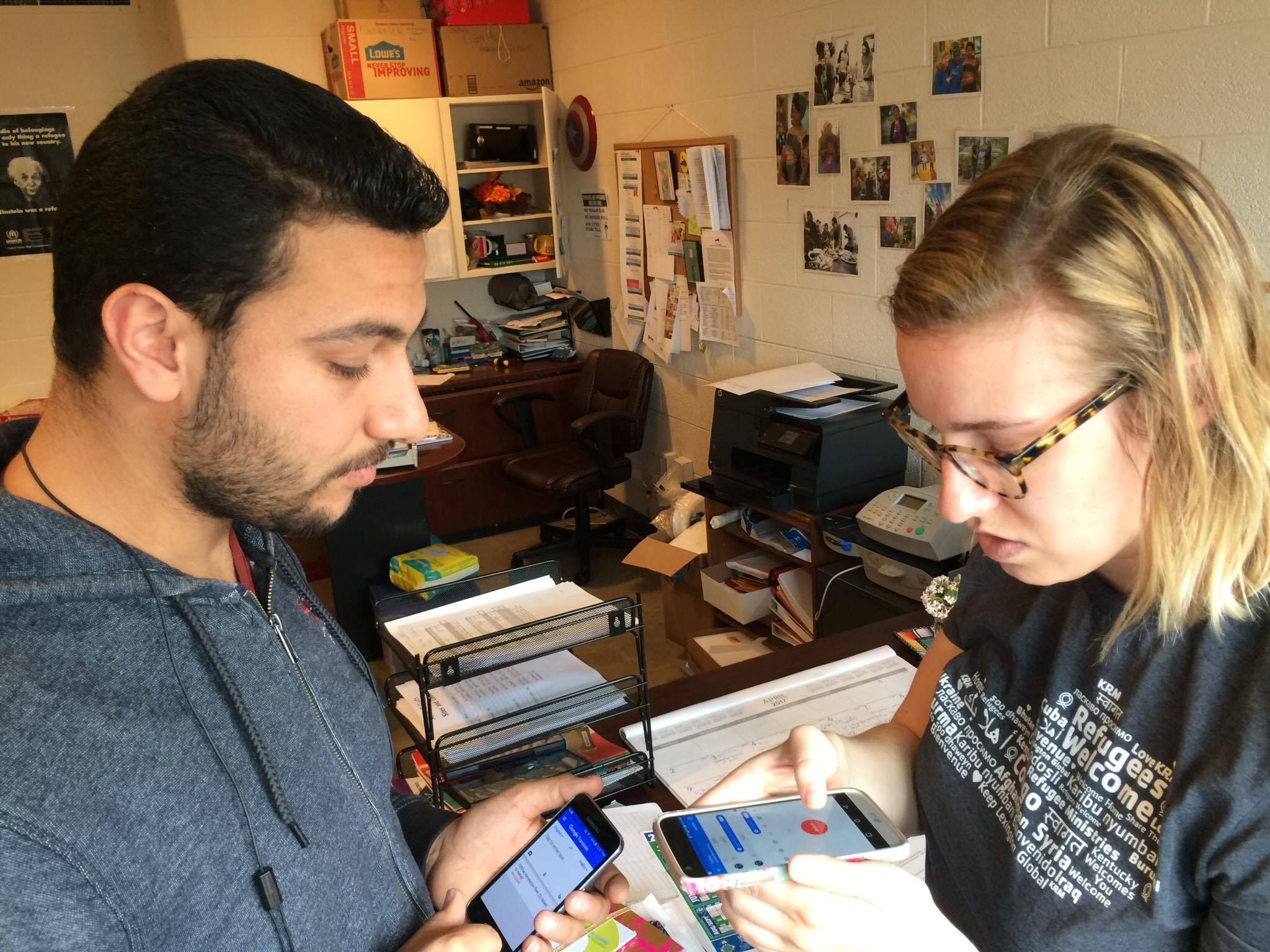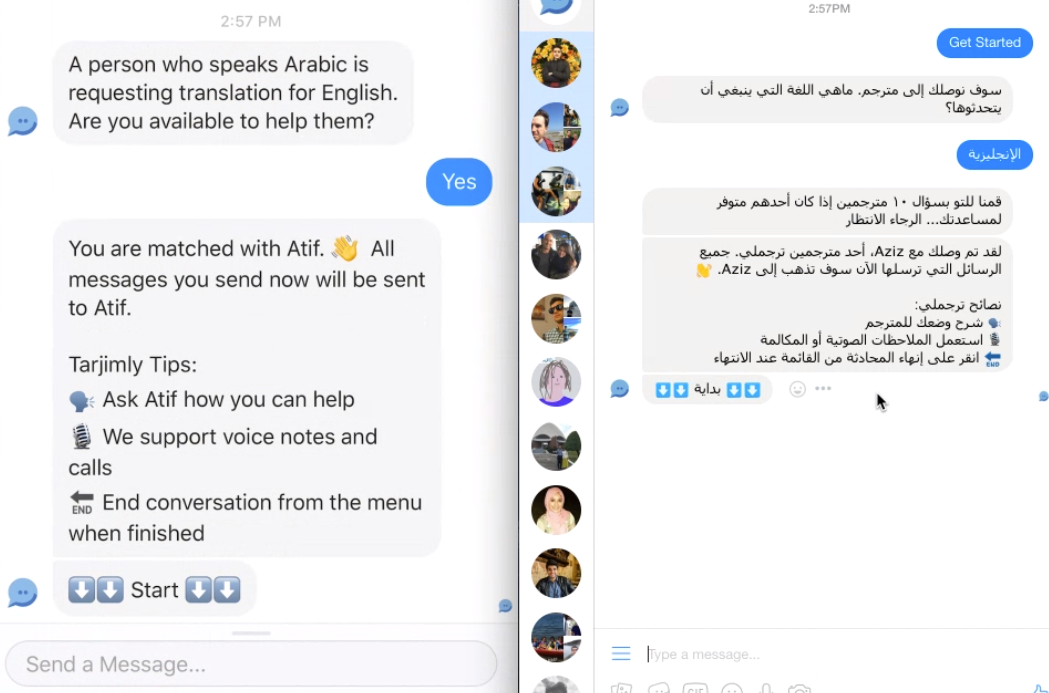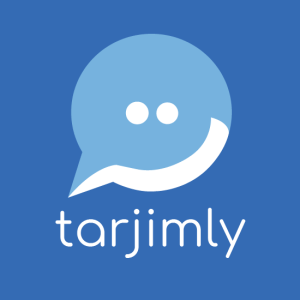All over the world, language barriers are limiting the ability of refugees and immigrants to seek help, and aid workers to provide it. Tarjimly is a new service that connects people who speak one language but need to speak in another, with a person who speaks both — in just a couple minutes. They’re part of Y Combinator’s latest batch and are now officially launched after a year building the product.
The company’s co-founders, Aziz Alghunaim and Atif Javed, told me how the company emerged from a side project built while they worked at Palantir and Oracle, respectively. It was a year ago, when the tide of refugees streaming out of the Middle East was growing.
“We wanted to do something to help refugees at scale, and decided to use our engineering experience,” said Javed. “We actually announced the first early version of the product during the first Muslim ban a year ago — we got a great response because people were happy to have another way to help other than give money or send emails.”
“We signed up like 1,500 people in two days,” added Alghunaim. “We decided to build a tech nonprofit to solve this problem, and quit in January.”
The basic problem is simply that there aren’t enough translators to go around, and the work they do can’t be delayed by the days or weeks it might take to find one; sometimes, as in cases where there’s imminent danger or critical logistical issues, it can’t be delayed by even an hour.
 “Interpreters are a scarce resource and extremely expensive,” Alghunaim said. Even for more commonly spoken languages like Spanish and German, they can run $80 per hour. “But then say you’ve got a family from Iraq right in front of you, and they speak Kurdish. Your pool of resources is extremely limited. And then there’s even Kurmanji Kurdish, and Sorani Kurdish, all these dialects.”
“Interpreters are a scarce resource and extremely expensive,” Alghunaim said. Even for more commonly spoken languages like Spanish and German, they can run $80 per hour. “But then say you’ve got a family from Iraq right in front of you, and they speak Kurdish. Your pool of resources is extremely limited. And then there’s even Kurmanji Kurdish, and Sorani Kurdish, all these dialects.”
You can’t stock every aid site or headquarters with dozens of interpreters, some of whom may only work a few hours a week. And relying on the local community (which some aid workers do) isn’t a good option either, since the populations are by definition the ones who need help, and anyway may not be around for long. That’s where Tarjimly comes in.
Quick turnaround translations
Right now Tarjimly is only on Facebook Messenger, but an independent, multi-platform app is on the way that will allow cross-platform chats, between Messenger or WhatsApp and SMS, for instance. Using the chat interface, an aid provider or refugee indicates their own language and the language of the person with whom they need to speak.
Tarjimly scours its database of volunteers and, using a bit of machine learning (naturally), it finds the users most likely to respond quickly. When it finds one, it connects the two through the chat interface; to make things easy and anonymous, the messages are relayed through Tarjimly’s servers, which both obscure the users’ IDs and allow cross-platform chats.

Once connected, the user can enter text or send voice messages; the volunteer just translates them and sends them back for the user to share with their interlocutor how they please. Audio and video chat can be requested, and documents and images can also be sent to the translators in case a quick consultation is necessary before signing something or waiting in a line.
The idea isn’t to guide people through major processes like immigration — dedicated interpreters are still needed for long interviews, technical language and so on — but to handle time-sensitive matters like distribution of food and water or explaining an event or injury.
“We’re focused on the real-time piece,” said Alghunaim. “We want to bridge that gap between the refugee and the service provider.”
“Refugees are constantly interacting with aid workers,” said Javed. “These people need this all the time — like literally every single aid worker needs this every day on the ground.”
Right now the service finds a match in an average of 90 seconds, and these acts of “micro-volunteering” usually only last a few minutes. Sixteen languages are currently supported (plus dialect variations), with a focus on those spoken by major refugee populations: English, Arabic, Persian, Pashto, Urdu, Spanish, French, Greek, Italian, Bengali, Turkish, Somali, German, Portuguese, Kurdish and Burmese.
The more than 2,500 translators on the service have already helped over 1,000 refugees in the time leading up to launch.
(Wondering whether machine translation has a role here? The truth is it’s just not good enough in many cases. The co-founders worked and studied in this space during their time at MIT and their previous jobs, and are confident that it’s not ready for an application like this, either in its capabilities or its state of deployment. “Language understanding is still very very early stage,” Alghunaim said.)
As for the possibility of bad translations, perhaps even intentional ones, Tarjimly does let users rate their experience, but Javed noted in a follow-up email that “We’re cultivating a strong community on FB where translators share feedback, ideas, and call out bad actors. One easy solution we have in mind is to use translators to QA each other.” But it hasn’t been a problem so far, he added.
Free where it matters
Tarjimly’s position as a nonprofit is a deliberate one; the company aims to fund the service through grants and donations in order to keep it free for refugees — a population that, while sizable and motivated, isn’t exactly ethical to monetize directly.
 “We’re going to start off with a grant-based model, but we want to create something that’s sustainable,” said Javed. “If we end up making a product that NGOs and governments are using, I have no doubt that if we go to them and say, ‘look, we want to keep this going,’ they’ll help.”
“We’re going to start off with a grant-based model, but we want to create something that’s sustainable,” said Javed. “If we end up making a product that NGOs and governments are using, I have no doubt that if we go to them and say, ‘look, we want to keep this going,’ they’ll help.”
They consider the service’s ability to scale quickly for low cost a major asset.
“When you ask for grant money, the first thing they ask about is your efficiency — cost versus impact. And we kill at that,” explained Alghunaim. “We create an impact that’s extremely low cost and scales exponentially in good created. Not everyone can do that much through technology.”
“We want to approach this the same way a Silicon Valley company would approach building a product — very user first,” added Javed. “Of course we want to form partnerships and so on, but we want to get this in the hands of millions of refugees tomorrow.”

Taking part in Y Combinator should help there; both founders were enthusiastic about the resources and feedback they’d already received from the accelerator.
The next step, apart from getting the service out there to attract more users and volunteers, is to continue working with aid organizations and people on the ground. The team has already spent a good deal of time on this side of things, but will soon depart for a two-week trip to Greece to chat with and observe refugees and aid workers there.
Millions of people could use something like this, so let’s hope it catches on. If you speak multiple languages, consider signing up as a volunteer; a few minutes of your time could make a serious difference to someone in need of immediate help.






























Comment